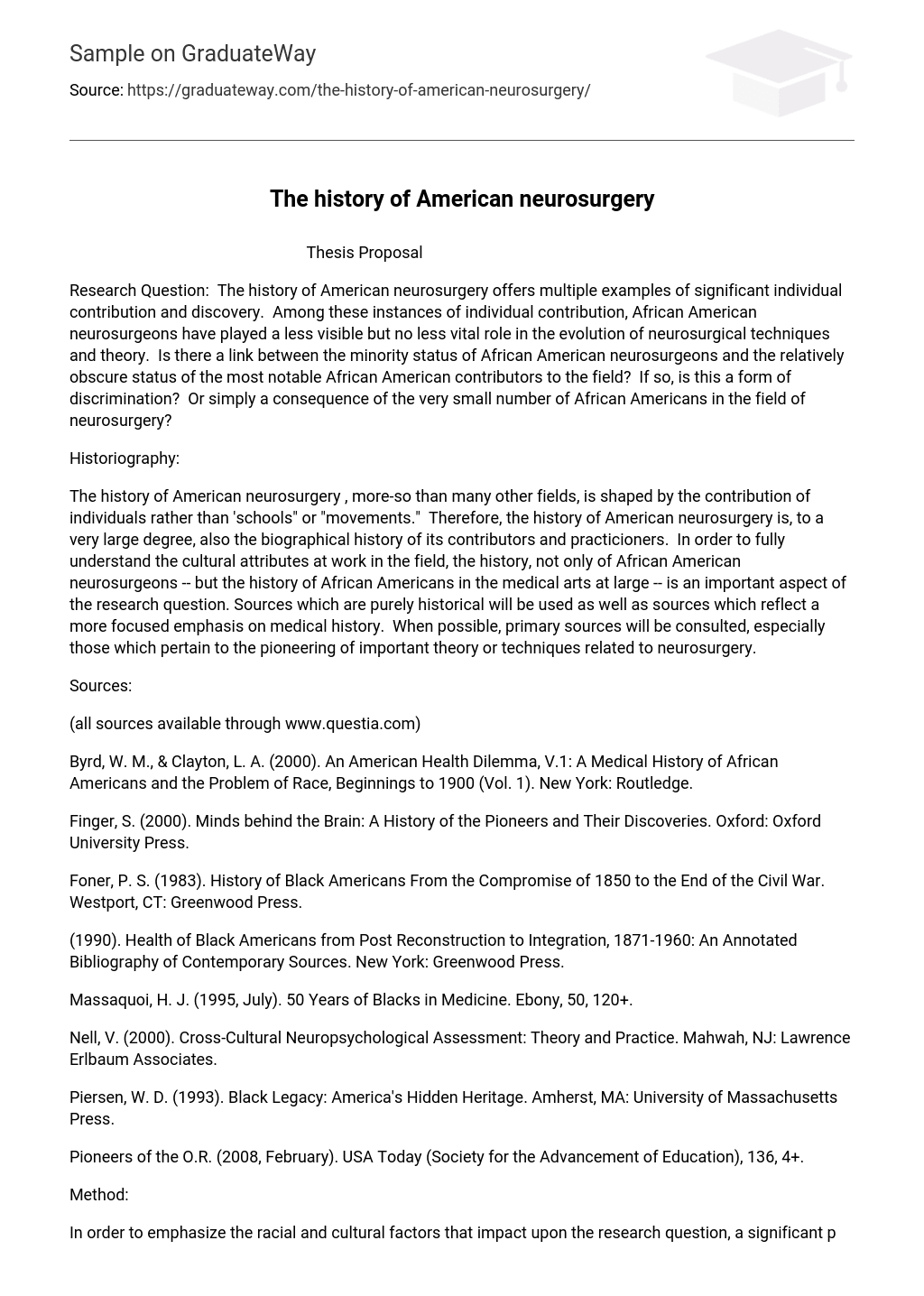Thesis Proposal
Research Question: The history of American neurosurgery offers multiple examples of significant individual contribution and discovery. Among these instances of individual contribution, African American neurosurgeons have played a less visible but no less vital role in the evolution of neurosurgical techniques and theory. Is there a link between the minority status of African American neurosurgeons and the relatively obscure status of the most notable African American contributors to the field? If so, is this a form of discrimination? Or simply a consequence of the very small number of African Americans in the field of neurosurgery?
Historiography:
The history of American neurosurgery , more-so than many other fields, is shaped by the contribution of individuals rather than ‘schools” or “movements.” Therefore, the history of American neurosurgery is, to a very large degree, also the biographical history of its contributors and practicioners. In order to fully understand the cultural attributes at work in the field, the history, not only of African American neurosurgeons — but the history of African Americans in the medical arts at large — is an important aspect of the research question. Sources which are purely historical will be used as well as sources which reflect a more focused emphasis on medical history. When possible, primary sources will be consulted, especially those which pertain to the pioneering of important theory or techniques related to neurosurgery.
Sources:
(all sources available through www.questia.com)
Byrd, W. M., & Clayton, L. A. (2000). An American Health Dilemma, V.1: A Medical History of African Americans and the Problem of Race, Beginnings to 1900 (Vol. 1). New York: Routledge.
Finger, S. (2000). Minds behind the Brain: A History of the Pioneers and Their Discoveries. Oxford: Oxford University Press.
Foner, P. S. (1983). History of Black Americans From the Compromise of 1850 to the End of the Civil War. Westport, CT: Greenwood Press.
(1990). Health of Black Americans from Post Reconstruction to Integration, 1871-1960: An Annotated Bibliography of Contemporary Sources. New York: Greenwood Press.
Massaquoi, H. J. (1995, July). 50 Years of Blacks in Medicine. Ebony, 50, 120+.
Nell, V. (2000). Cross-Cultural Neuropsychological Assessment: Theory and Practice. Mahwah, NJ: Lawrence Erlbaum Associates.
Piersen, W. D. (1993). Black Legacy: America’s Hidden Heritage. Amherst, MA: University of Massachusetts Press.
Pioneers of the O.R. (2008, February). USA Today (Society for the Advancement of Education), 136, 4+.
Method:
In order to emphasize the racial and cultural factors that impact upon the research question, a significant part of the research and final paper will involve a comparative study of statistics which can be used to compare the per capita percentage of African Americans and other races in the medical field as a whole commencing from the late nineteenth century around the time of Eiselberg’s birth to establish the general figures which surround the minority status of African Americans in the medical field. Following these statistics will be a more focused comparison of per capita participation of African Americans in the field of neurosurgery. After the statistics have been thoroughly presented, a brief examination of the history of non-African American contributors to the field of neurosurgery will be presented and then, a close study of the contribution of Ben Carson will be used to accent the profound influence of this African American on the field. Some time will be devoted to examining whether or not the cultural and racially charged history of American society has either prevented or enabled important contributions by African Americans to the field of neurosurgery. The paper will conclude by asserting that cultural biases have negatively influenced the potential for contributions by minority races (and genders) to the field but that this tendency is slowly evolving toward a more inclusive policy and awareness in America. The result of a more inclusive field will be a more robust theory and a better set of techniques and solutions.





